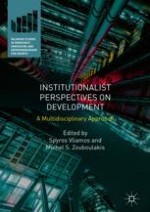2018 | OriginalPaper | Chapter
EU–Russia Antagonism in South-Eastern Europe: The Energy Factor
Author : Andreas Stergiou
Published in: Institutionalist Perspectives on Development
Publisher: Springer International Publishing
Activate our intelligent search to find suitable subject content or patents.
Select sections of text to find matching patents with Artificial Intelligence. powered by
Select sections of text to find additional relevant content using AI-assisted search. powered by
